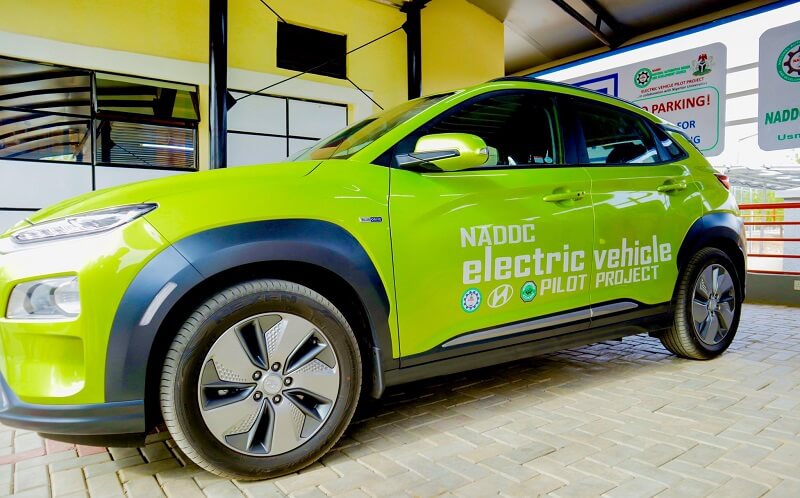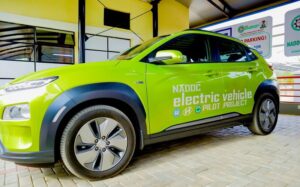

You might not realize it yet, but Nigeria is poised to lead the electric vehicle revolution in Africa. Sure, the country still struggles with providing reliable electricity in many areas, but it also has some key ingredients for major growth in eco-friendly transport. Nigeria is home to over 200 million people, making it the most populous country on the continent with a huge potential market for electric vehicles. It also has abundant sunshine that can power solar-charging stations and the raw materials to make batteries.
Not to mention, the youth are demanding greener options. Over 60% of the country is under 25 and concerned about climate change. They want affordable and sustainable vehicles, not expensive gas-guzzlers. Local startups and big brands alike are taking notice. Companies from Volkswagen to Nissan to Nigeria’s own JET Motor Company are investing in the Nigerian EV market.
The time is ripe for an EV boom that could transform transportation in Nigeria and set an example for other African nations. While the country still has a long way to go to overhaul its infrastructure, Nigeria has the drive, the resources and the ambition to leapfrog into a greener era of mobility. The electric vehicle revolution may just start in the unlikeliest of places. In Nigeria, the future of transport is electrifying.
The Current State of Electric Vehicles in Nigeria
Electric vehicles (EVs) are slowly gaining traction in Nigeria, but still have a long way to go before reaching mainstream adoption.
The Nigerian government has set an ambitious goal of achieving a fully electrified vehicle fleet by 2050. While the vision is there, the infrastructure and policies to support it are still lagging. Charging stations are few and far between, found mainly in a couple of major cities like Lagos and Abuja. And high import duties on EVs – currently 50-100% of the vehicle cost – make them unaffordable for most.
However, several factors point to Nigeria being primed for an EV revolution in the coming decades:
- Low cost of electricity. Nigeria has abundant sources of renewable energy, like solar and hydro, that can provide inexpensive electricity for vehicle charging.
- High cost of gas. Nigeria imports the majority of its fuel, so gas prices are quite high. The fuel cost savings of EVs could incentivize their adoption.
- Dense urban populations. With many Nigerians living in traffic-clogged cities, EVs provide an opportunity to reduce noise and air pollution from gas-powered vehicles.
- Youth interest in technology and green energy. Nigeria has a young, tech-savvy population that is concerned about environmental issues like climate change. EVs appeal to their interests and values.
If the government invests in building out charging infrastructure, provides subsidies and tax incentives for EV purchases, and transitions more of the grid to renewable energy, Nigeria could become a leader in the African EV market. The demand is there, it just needs to be supported through policy and access. An electric vehicle revolution could be on the horizon.
Factors Driving Adoption of EVs in Nigeria
With a population of over 200 million and the largest economy in Africa, Nigeria is poised to become an emerging market for electric vehicles (EVs). Several factors are driving the adoption of EVs in Nigeria:
Infrastructure development
The government aims to improve infrastructure to make EVs a viable option. Plans are underway to build more solar and wind farms to boost renewable energy and power EV charging stations across the country. Major cities are also investing in public transit systems, with opportunities for e-busses and e-motorcycles.
Reducing oil dependence
Nigeria wants to decrease its economic dependence on oil. By promoting EVs and renewable energy, Nigeria can tap into new revenue streams and job growth in manufacturing, technology and other sectors. This can help cushion the impact of oil price shocks and diversify the economy.
Environmental benefits
With worsening pollution and climate change impacts, EVs provide environmental upsides like lower emissions and noise. The government aims to reduce greenhouse gas emissions and transition to more sustainable energy and transport systems. EVs can play a key role in achieving these goals.
Cost savings
Although initial costs are higher, EVs are cheaper to fuel and maintain than gas-powered vehicles in the long run. This can save individuals and businesses money, especially with increasing gas prices. As battery technology improves and manufacturing scales up, EV costs are projected to decrease, making them even more affordable and attractive.
Nigeria’s vision is to become a key player in the global EV market over the next decade. By investing in infrastructure, transitioning to renewable energy, and promoting EVs, Nigeria can enjoy environmental, economic and social benefits that will resonate for generations to come. The future of driving in Nigeria is electric!
Government Policies to Encourage EV Growth
The Nigerian government has implemented several policies aimed at accelerating the adoption of electric vehicles. These policies, combined with Nigeria’s need for improved transportation infrastructure and reduced dependence on oil, have created favourable conditions for the EV market to grow quickly.
Import Duties Exemption
In 2020, the government announced a full exemption from import duties on fully electric vehicles for two years. This makes EVs much more affordable for consumers and encourages major automakers to sell more e-vehicles in the Nigerian market. The policy is already catalyzing growth—several automakers like Hyundai and Volkswagen plan to start selling EVs in Nigeria soon.
Public Charging Infrastructure Funding
The lack of charging infrastructure is a major barrier to EV adoption, so the government launched a program to deploy solar-powered charging stations across the country. The program’s goal is to build 10,000 stations in the next three years, with many located in Lagos and Abuja. Widespread charging will give potential buyers confidence that they can easily refuel their EVs.
Transitioning Government Fleets
Federal government agencies were directed to start transitioning their vehicle fleets to electric. The Ministry of Transportation aims to convert 50% of government vehicles to EVs by 2025. Not only will this reduce emissions, but it also stimulate the EV market by providing automakers with large initial orders. The sight of government EVs on the road may also encourage more public interest and acceptance of e-vehicles.
If these pro-EV policies are sustained and expanded, Nigeria is poised to become a leader in electric vehicle growth on the African continent. Widespread adoption could help address energy security issues, reduce air pollution, and position Nigeria as an innovative economy of the future. The potential is huge if the country can overcome obstacles like improving its electrical grid and making EVs affordable for average citizens. But the building blocks are in place for an EV revolution.
Challenges Facing Widespread EV Adoption
While Nigeria seems poised for major growth in electric vehicle (EV) adoption, several obstacles stand in the way of widespread EV ownership in the country.
Infrastructure Deficiencies
For EVs to take off in Nigeria, more charging infrastructure needs to be built. At present, there are only a few public charging stations in major cities like Lagos and Abuja. Drivers without home charging access will be hesitant to purchase EVs until more public charging is available, especially for longer drives. The good news is, that as EVs become more popular, more charging infrastructure will likely follow.
High Upfront Costs
Although EVs have lower fuel and maintenance costs over their lifetime, the initial purchase price of an EV in Nigeria remains quite high compared to a comparable gas-powered car. Import duties and lack of government incentives or rebates contribute to the cost premium. For many Nigerian drivers, the upfront cost is a barrier to choosing an EV over a cheaper gas-powered option, even if it means higher costs down the road. Creative financing and leasing options could help address this challenge.
Reliance on Fossil Fuels
Nigeria’s electricity grid depends heavily on fossil fuels like natural gas and coal. So while EVs themselves produce zero direct emissions, the electricity used to charge them is still generated mainly from carbon-intensive sources. For EVs to provide maximum environmental benefit in Nigeria, more renewable energy like solar and wind power needs to be integrated into the grid. Some at-home solar charging systems are helping address this issue for individual EV owners.
Limited Model Options
Another factor limiting EV adoption in Nigeria is simply the lack of available models to choose from. Most major automakers do not currently offer their EVs for sale in Nigeria, though some like Hyundai have announced plans to start selling EVs in Nigeria soon. With more models to choose from, especially in popular vehicle classes like SUVs, EVs can appeal to a wider range of Nigerian drivers.
While Nigeria’s transition to EVs will take time, the potential benefits to the economy, environment, and health of Nigerians make it a goal worth pursuing vigorously. With government support, infrastructure investment, and an influx of affordable EV models, an electric vehicle revolution could be on the horizon for Nigeria.
The Future Is Electric: Nigeria’s Untapped Potential for EVs
Nigeria is uniquely positioned to become a leader in electric vehicle adoption on the African continent. Several factors point to Nigeria’s untapped potential for EVs.
Infrastructure Investment
The Nigerian government has prioritized improving infrastructure, including expanding the power grid and building EV charging stations. With increased access to electricity, especially renewable energy like solar, more Nigerians will be able to charge EVs. The government’s goal is to install 10,000 EV charging stations across the country by 2025.
Low Cost of Ownership
The total cost of ownership for EVs in Nigeria is lower compared to gas-powered cars. Electricity is cheaper than gasoline, and EVs have lower maintenance costs given fewer moving parts. For average Nigerians looking for an affordable way to commute, EVs provide an attractive option.
Environmental Concerns
Nigeria has a growing concern for environmental protection and reducing pollution. The adoption of EVs would help decrease air pollution and Nigeria’s carbon footprint. EVs produce zero direct emissions, so they are better for the environment and public health.
Jobs and Economic Growth
Nigeria’s EV industry could spur new jobs in manufacturing, technology, and other sectors. Local assembly and production of EVs and parts may boost economic growth. Nigeria is poised to become an EV manufacturing hub for West Africa.
While there are still challenges around EV adoption in Nigeria like upfront costs, limited model options, and range anxiety, the potential benefits to the economy, environment, and energy security are substantial. With the government’s support, Nigeria’s electric vehicle revolution could transform transportation and make the country a leader in sustainable mobility. The future of driving in Nigeria is electric.
Conclusion
So there you have it, Nigeria has all the right ingredients to lead the charge for electric vehicles in Africa. With a huge population, an emerging middle class, and a forward-thinking government committed to renewable energy, the growth potential is enormous. The demand is there, the infrastructure is improving, and the policies are in place. All that’s missing is you. If you’re an automaker looking to tap into a new market or an entrepreneur seeking an opportunity, Nigeria’s EV revolution is waiting to happen. The time is now to get on board, shape the future of transportation in Nigeria, and make history in the process. The road ahead is paved for EVs – what are you waiting for? Jump on in, the future’s electric!


Be the first to comment